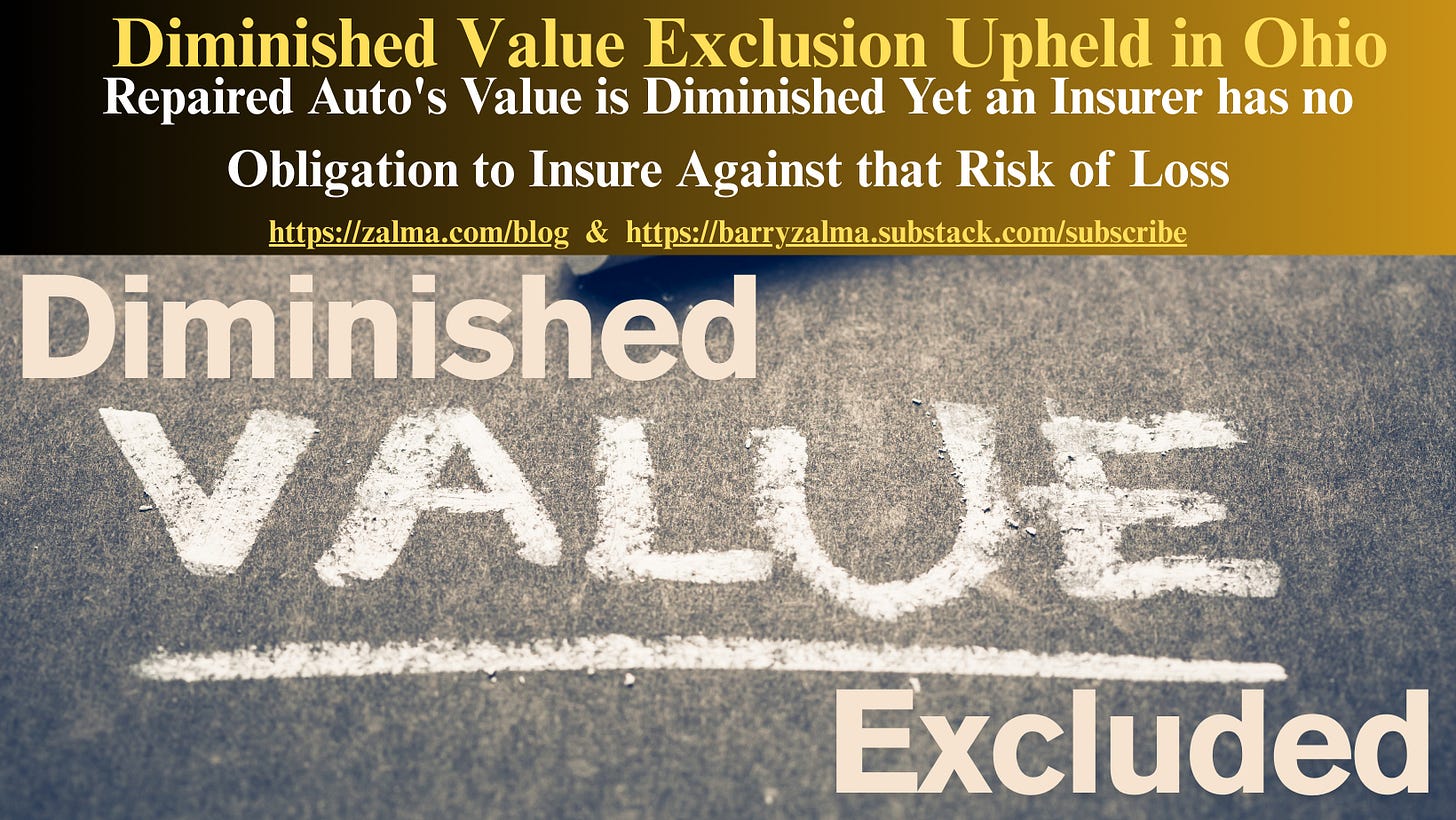Diminished Value Exclusion Upheld in Ohio
Repaired Auto's Value is Diminished Yet an Insurer has no Obligation to Insure Against that Risk of Loss
Post 5082
See the full video at https://lnkd.in/gkhQsW74 and at https://lnkd.in/g9C29M8s, and at https://zalma.com/blog plus more than 5050 posts.
Yolanda Fincher appealed the judgment of the Hamilton County Municipal Court granting summary judgment in favor of State Farm Mutual Automobile Insurance Company ("State Farm" ).
Yolanda Fincher appealed the judgment of the Hamilton County Municipal Court granting summary judgment in favor of State Farm Mutual Automobile Insurance Company ("State Farm" ). Fincher sued State Farm for the diminished value of her vehicle following a car accident that damaged the car.
In Yolanda Fincher v. State Farm Mutual Automobile Insurance Company, 2025-Ohio-1752, No. C-240550, Court of Appeals of Ohio, First District, Hamilton (May 16, 2025) resolved her claim.
FACTUAL HISTORY
Fincher's complaint alleged that, on August 4, 2021, she was in a car accident with an uninsured motorist that injured her and damaged her car. She asserted that she retained an insurance contract with State Farm and that the company violated the contract by failing to cover the diminished value of her car.
She sought $14,500 in damages, representing the diminished value to her vehicle's Kelly Blue Book value plus interest.
After State Farm answered the complaint, the matter was referred to a magistrate for disposition. The magistrate scheduled a January 5, 2024 trial date. State Farm filed a motion for summary judgment, arguing in part that it was entitled to judgment as a matter of law because Fincher's policy did not cover diminished value. State Farm supported its summary judgment motion with a certified copy of Fincher's policy, which its records custodian described as State's Farm ordinary business record. Fincher did not respond to State Farm's motion for summary judgment.
After the magistrate denied State Farm's summary judgment motion. State Farm objected to the magistrate's decision denying its motion for summary judgment. In its objection, State Farm argued that magistrate erred because Fincher had failed to rebut the summary judgment motion with disputed facts and because Fincher's policy excluded diminished value coverage.
Fincher responded but she cited no facts in evidence to support these assertions. In its response, State Farm pointed to the lack of evidence supporting Fincher's claims.
The trial court ruled on State Farm's objections and sustained State Farm's objection to the magistrate's decision and granted State Farm's motion for summary judgment. The trial court also granted State Farm's motion to strike and Fincher appealed.
SUMMARY JUDGMENT
First, Fincher contended that the trial court acted unfairly in failing to grant her a continuance based on her legitimate medical needs and asserted that she is entitled to recover for the diminished value of her vehicle because she never received a copy of her policy from State Farm.
Summary judgment is proper under Civ.R. 56(C) where:
(1) no genuine issue of material fact remains,
(2) the moving party is entitled to judgment as a matter of law, and
(3) it appears from the evidence that reasonable minds can come to but one conclusion even when construing the evidence most strongly in favor of the nonmoving party, that conclusion is adverse to the party against whom the motion for summary judgment is made.
The moving party has the initial burden of demonstrating its entitlement to summary judgment. State Farm, as the moving party met its initial burden by informing the trial court of the basis for the motion and identifying the portions of the record that demonstrate that there is an absence of evidence to support the nonmoving party's case.
Then non-moving party may not rest upon the mere allegations or denials of the party's pleadings. Instead, the non-moving party must set forth specific facts showing that there is a genuine issue for trial. If the non-moving party fails to respond or to support its response with appropriate summary judgment evidence, the trial court may grant summary judgment.
The Finding
State Farm met its initial burden by presenting a certified copy of Fincher's insurance policy, which excluded coverage for diminished value. Once State Farm presented this evidence, the burden shifted to Fincher to provide evidence showing that there remained a genuine issue of material fact for trial. Fincher failed to respond to the motion for summary judgment and failed to sustain her burden as the non-moving party. The trial court's summary judgment decision was, accordingly correct.
The entire purpose of the summary judgment proceeding is to ascertain whether there were any issues to be tried in the case. Once the trial court determined there were not, it properly vacated the trial date.
Because Fincher's insurance contract with State Farm does not include diminished value coverage the trial court did not err in awarding summary judgment to State Farm.
Accordingly the judgment of the trial court was affirmed.
ZALMA OPINION
At one time making an insurer pay for the diminished value of an insured car after it was repaired was exceedingly popular in courts across the country. Insurers like State Farm, who were made to pay for damages that were not expected or insured against, learned their lesson and put exclusions in the policy. Fincher's policy with State Farm contained that exclusion so she properly got nothing from her suit.
(c) 2025 Barry Zalma & ClaimSchool, Inc.
Please tell your friends and colleagues about this blog and the videos and let them subscribe to the blog and the videos.
Subscribe to my substack at https://barryzalma.substack.com/subscribe
Go to X @bzalma; Go to Barry Zalma videos at Rumble.com at https://rumble.com/account/content?type=all; Go to Barry Zalma on YouTube- https://www.youtube.com/channel/UCysiZklEtxZsSF9DfC0Expg; Go to the Insurance Claims Library – https://lnkd.in/gwEYk






